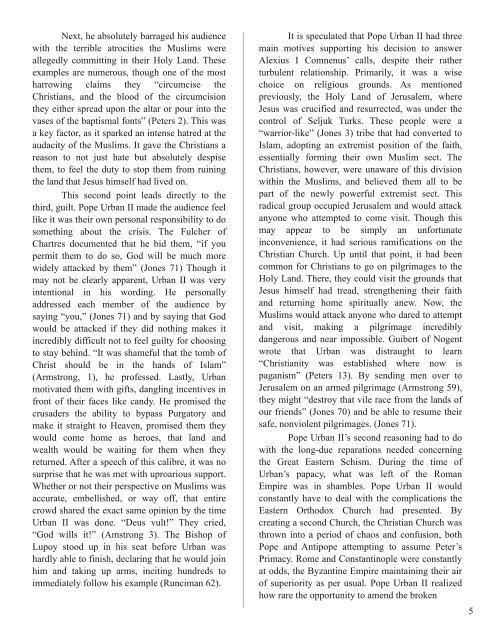Create successful ePaper yourself
Turn your PDF publications into a flip-book with our unique Google optimized e-Paper software.
Next, he absolutely barraged his audience<br />
with the terrible atrocities the Muslims were<br />
allegedly committing in their Holy Land. These<br />
examples are numerous, though one of the most<br />
harrowing claims they “circumcise the<br />
Christians, and the blood of the circumcision<br />
they either spread upon the altar or pour into the<br />
vases of the baptismal fonts” (Peters 2). This was<br />
a key factor, as it sparked an intense hatred at the<br />
audacity of the Muslims. It gave the Christians a<br />
reason to not just hate but absolutely despise<br />
them, to feel the duty to stop them from ruining<br />
the land that Jesus himself had lived on.<br />
This second point leads directly to the<br />
third, guilt. Pope Urban II made the audience feel<br />
like it was their own personal responsibility to do<br />
something about the crisis. The Fulcher of<br />
Chartres documented that he bid them, “if you<br />
permit them to do so, God will be much more<br />
widely attacked by them” (Jones 71 ) Though it<br />
may not be clearly apparent, Urban II was very<br />
intentional in his wording. He personally<br />
addressed each member of the audience by<br />
saying “you,” (Jones 71 ) and by saying that God<br />
would be attacked if they did nothing makes it<br />
incredibly difficult not to feel guilty for choosing<br />
to stay behind. “It was shameful that the tomb of<br />
Christ should be in the hands of Islam”<br />
(Armstrong, 1 ), he professed. Lastly, Urban<br />
motivated them with gifts, dangling incentives in<br />
front of their faces like candy. He promised the<br />
crusaders the ability to bypass Purgatory and<br />
make it straight to Heaven, promised them they<br />
would come home as heroes, that land and<br />
wealth would be waiting for them when they<br />
returned. After a speech of this calibre, it was no<br />
surprise that he was met with uproarious support.<br />
Whether or not their perspective on Muslims was<br />
accurate, embellished, or way off, that entire<br />
crowd shared the exact same opinion by the time<br />
Urban II was done. “Deus vult!” They cried,<br />
“God wills it!” (Amstrong 3). The Bishop of<br />
Lupoy stood up in his seat before Urban was<br />
hardly able to finish, declaring that he would join<br />
him and taking up arms, inciting hundreds to<br />
immediately follow his example (Runciman 62).<br />
It is speculated that Pope Urban II had three<br />
main motives supporting his decision to answer<br />
Alexius I Comnenus’ calls, despite their rather<br />
turbulent relationship. Primarily, it was a wise<br />
choice on religious grounds. As mentioned<br />
previously, the Holy Land of Jerusalem, where<br />
Jesus was crucified and resurrected, was under the<br />
control of Seljuk Turks. These people were a<br />
“warrior-like” (Jones 3) tribe that had converted to<br />
Islam, adopting an extremist position of the faith,<br />
essentially forming their own Muslim sect. The<br />
Christians, however, were unaware of this division<br />
within the Muslims, and believed them all to be<br />
part of the newly powerful extremist sect. This<br />
radical group occupied Jerusalem and would attack<br />
anyone who attempted to come visit. Though this<br />
may appear to be simply an unfortunate<br />
inconvenience, it had serious ramifications on the<br />
Christian Church. Up until that point, it had been<br />
common for Christians to go on pilgrimages to the<br />
Holy Land. There, they could visit the grounds that<br />
Jesus himself had tread, strengthening their faith<br />
and returning home spiritually anew. Now, the<br />
Muslims would attack anyone who dared to attempt<br />
and visit, making a pilgrimage incredibly<br />
dangerous and near impossible. Guibert of Nogent<br />
wrote that Urban was distraught to learn<br />
“Christianity was established where now is<br />
paganism” (Peters 1 3). By sending men over to<br />
Jerusalem on an armed pilgrimage (Armstrong 59),<br />
they might “destroy that vile race from the lands of<br />
our friends” (Jones 70) and be able to resume their<br />
safe, nonviolent pilgrimages. (Jones 71 ).<br />
Pope Urban II’s second reasoning had to do<br />
with the long-due reparations needed concerning<br />
the Great Eastern Schism. During the time of<br />
Urban’s papacy, what was left of the Roman<br />
Empire was in shambles. Pope Urban II would<br />
constantly have to deal with the complications the<br />
Eastern Orthodox Church had presented. By<br />
creating a second Church, the Christian Church was<br />
thrown into a period of chaos and confusion, both<br />
Pope and Antipope attempting to assume Peter’s<br />
Primacy. Rome and Constantinople were constantly<br />
at odds, the Byzantine Empire maintaining their air<br />
of superiority as per usual. Pope Urban II realized<br />
how rare the opportunity to amend the broken<br />
5


